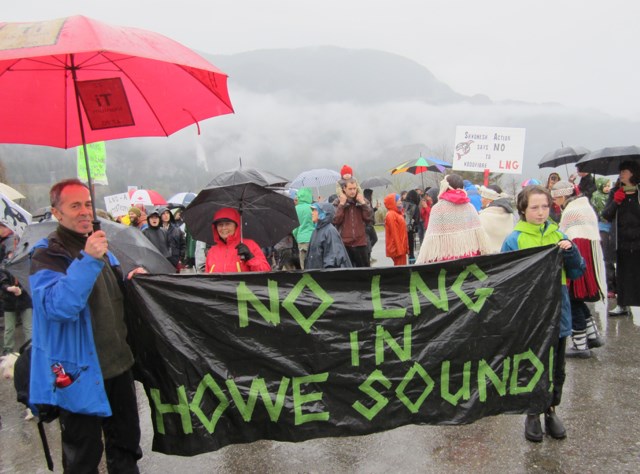We’re on a bus – the trusty Peter King at the wheel – going to Squamish to stand with the Skwomesh Action group to protect our home. We’re travelling down one of the most picturesque highways on the planet, The Sea to Sky Highway, 25 Bowen Islanders who want to keep the “natural” in supernatural B.C. We’ve been fired up by the smooth talk of provincial salesmen telling us the Woodfibre LNG plant and super tankers would be good for Bowen. We’re missing most of the great scenery because of the pouring rain, but our spirits are not dampened. We’ll join 500 others – from Bowen, Lion’s Bay, West Vancouver, and Squamish, all residents of this beautiful inlet who want to keep it that way.
I move around on the bus to find out why people are willing to get wet and cold. They don’t look like radicals, just regular folk who care deeply. They range in age from 11 (Simon) to 83 (Paul), from newcomers to oldtimers like Bonny and Robb Schultz who came to Bowen in 1972. “We have to step up,” says Bonny; Robb decided to step up when he heard Eoin Finn express his grave concerns about an LNG export facility in Howe Sound. “I saw a problem, and it was more imminent that I thought. Bowen is a real jewel. We need to protect it. The LNG plan is a real threat to the future – a betrayal to our children.”
Ann Ramsay, not anyone’s idea of a radical, believes this is a non-partisan issue. “Everyone should be concerned. We should be abiding by the safety rules.” Ann is referring to SIGTTO, the world authority on LNG siting, which states that the busy, narrow waterway of Howe Sound is no place for LNG. “This is something I absolutely have to do – rain or shine,” says Allie Drake. “It’s one thing we can do to make an impression.” Dr. Leah Cline is quite naturally concerned with the health aspects. “The health of our Sound – our home – is intimately connected with our own health.” She won’t support something that will threaten the health of the Sound.
Kim Kasasian wants to be counted and hopes the numbers will be big. “All the reasons for not doing this have been clearly stated. A recent David Suzuki Foundation report on Natural Capital (the services nature provides for free) indicates that the services provided by Howe Sound would amount to more than $800 million dollars a year.” Paul Fast wants to “play his part to stop the giveaway of our natural resources.”
Chris Corrigan’s on the bus “because this is a local and important action of reconciliation and support for those that host us on this land. We’re being invited to come and be helpful by showing up. The importance of reconciliation is that we can do more together than separately.”
Jack Resels moved to Bowen just three weeks ago; he’s on the bus because of the future. “I think about future generations and how great for them to have what we have now – clean water, clean air, seals and whales and no tankers – all the beauty that attracted us here.”
Brent O’Malley wants to support the ongoing revitalization of Howe Sound and stop the possible return to industrialization. “I have a vested interest,” he admits. “I own the kayak shop.” When I mention the possibility of the need for what Naomi Klein calls “Blockadia” - to physically stop the tankers from entering the Sound - Brent tells me he has 40 kayaks – 20 singles and 20 doubles – enough to get 60 people out into the Sound.
Betty Morton wants to “partner with the First Nations to protect Howe Sound – my playground for 40 years.” Peter Williamson is interested in “sending a message to Christy Clark that this is a bad idea.” Gillian Darling shakes her head: “I can’t imagine why anyone would want to desecrate Howe Sound with an LNG export terminal.” Martin Clarke is “fed up with this nonsense. After years spent reclaiming the Sound, it looks like they want to return to industrialization.” Anton van Walraven is here “to connect with the Squamish and show government we are one on this issue.”
We’re here. In Squamish. We get off the bus, stand in silence, our heads tilted to admire the beauty at the top of our inlet - Shannon Falls, the Squamish Chief. We’re here to support Joyce Williams and the others who organized this event. Her love for her home – our home - brought us here. Her words brought us here: “God forbid our land should be totally devastated and the children ask: “What did you do to stop it?”
In part 3, we will look at other partners involved in the protection of Howe Sound.
Pauline Le Bel is the author of Becoming Intimate with the Earth, published by Collins Foundation Press.



